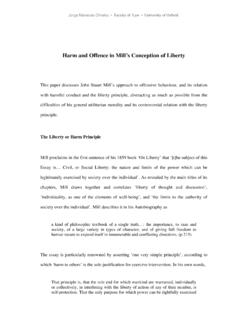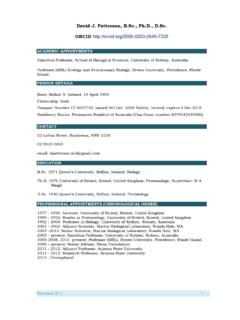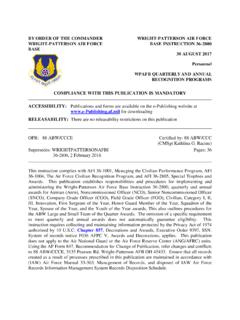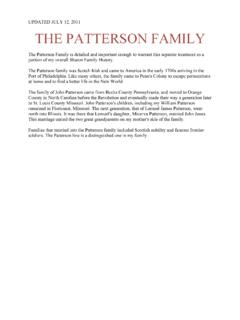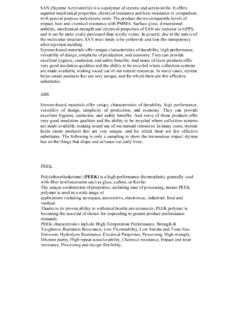Transcription of Dennis Patterson Rutgers University Departments of Law and ...
1 Interpretation in Law Dennis Patterson Rutgers University Departments of Law and Philosophy Copyright Dennis Patterson 2003 This is a Draft- please do not cite or quote. 2 Interpretation is a familiar feature of law and legal practice. For some legal theorists, interpretation is a central even foundational aspect of law. Despite many discussions of interpretation, in a variety of legal theoretical contexts, there remains widespread disagreement over the nature of interpretation in law. It may well be that the reason interpretation remains a widely-contested aspect of legal theory is that our very conception of what counts as law may depend on a proper understanding of the role of interpretation in law.
2 I argue that interpretation is a second-order feature of legal practice. In other words, I want to disagree with those who make the case for interpretation as a basic or fundamental feature of legal While interpretation is certainly an important 1 See, , RONALD DWORKIN LAW S EMPIRE (1986) (hereafter LE ). I anticipate that some will take issue with my characterization of Dworkin s interpretivism. One version of this criticism is that Dworkin is not really making a semantic argument at all. Rather, his claims are normative in nature and, thus, not susceptible to critique in the same manner as, say, Stanley Fish.
3 At a minimum, I think this is a contestable reading of the argument in LAW S EMPIRE. I will not make a sustained argument at this point because time does not permit it, and I have already made the case elsewhere (see Dennis Patterson , LAW AND TRUTH 76-98 (1996)). I will, however, record my complete agreement with Gerald Postema s characterization of a central problem with Dworkin s argument. See Gerald Postema, Protestant Interpretation and Social Practices, 6 LAW & PHIL. 283, 288-89 (1987) ( [W]hile [Dworkin] regards the activity of the practice [of law] as public and collective, he seems to regard the enterprise of understanding that activity as private and individual.)
4 I shall argue that Dworkin s theory thus interpreted fails to describe adequately participant understanding of common social practices. ). Dworkin leaves us in no doubt when it comes to the pervasive nature of interpretation in law. For Dworkin, there is no in principle difference between easy and hard cases: We have been attending mainly to hard cases, when lawyers disagree whether some crucial proposition of law is true or false. But questions of law are sometimes very easy for lawyers and even for nonlawyers. It goes without saying that the speed limit in Connecticut is 55 miles an hour and that people in Britain have a legal duty to pay for food they order in a restaurant.
5 At least this goes without saying except in very unusual circumstances. A critic might be tempted to say that the complex account we have developed of judicial reasoning under law as integrity is a method for hard cases only. He might add that it would be absurd to apply the method to easy cases--no judge needs to consider questions of fit and political morality to decide whether someone must pay his telephone bill--and then declare that in addition to his theory of hard cases, Hercules needs a theory about when cases are hard, so he can know when his complex method for hard cases is appropriate and when not.
6 The critic will then announce a serious problem: it can be a hard question whether the case at hand is a hard case or an easy case, and Hercules cannot decide by using his technique for hard cases without begging the question. This is a pseudoproblem. Hercules does not need one method for hard cases and another for easy ones. His method is equally at work in easy cases, but since the answers to the questions it puts are then obvious, or at least seem to be so, we are not aware that any theory is at work at all. 3element of legal practice, it is an activity that depends upon widespread agreement among legal practitioners with respect to most features of legal practice.
7 In short, interpretation is important but it is not foundational. I do not wish to deny that interpretation is an important aspect of the practice of law. Rather, my aim is to clarify the nature of interpretation in law. But before we can begin to understand more clearly the nature of interpretation in law, we must first understand that to which interpretation is a second-order activity. If interpretation is, as I suggest, a second-order activity, to what does it owe its second-order status? Interpretation arises from the firmament of praxis. Interpretation is grounded in and parasitic upon established forms of action that all participants recognize and employ in making, appraising and adjudicating claims about the state of the law.
8 Interpretation is grounded in and arises from a distinct form of discursive action we recognize as legal in nature. Thus, explication of the nature of legal understanding is a necessary preliminary. Only with a clear view of the nature of understanding in law can we turn to explicating the nature and scope of interpretation in law. When we look at how participants in law engage in interpretation, the activity can best be described by a few We think the question whether someone may legally drive faster than the stipulated speed limit is an easy one because we assume at once that no account of the legal record that denied that paradigm would be competent.
9 But someone whose convictions about justice and fairness were very different from ours might not find that question so easy; even if he ended by agreeing with our answer, he would insist that we were wrong to be so confident. This explains why questions considered easy during one period become hard before they again become easy questions--with the opposite answers. RONALD DWORKIN, LE, at 353-54. Compare Nicos Stavropoulos, Interpretivist Theories of Law, Stanford Encyclopedia of Philosophy (2003). 4general principles. These principles capture what it is that lawyers do when they must, of necessity, interpret the law.
10 This essay is divided into three principal parts. In Part I, I reprise an argument I and others have made about the logical status of interpretation. I add to the discussion of the role of interpretation in understanding by making the claim that interpretation is what I term a second-order activity, the efficacy of which is dependent upon understanding already being in place. In Part II, I explicate what it means to understand the law. Again drawing on my earlier work,2 I explain that understanding law is a matter of being the master of a technique, specifically a technique of argument.
